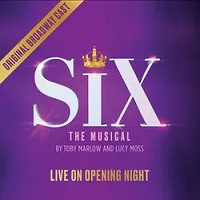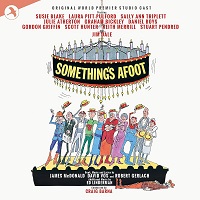 Studio Cast, 2020 (JAY Records)
Studio Cast, 2020 (JAY Records)  (1 / 5) Nearly 50 years after the show’s opening and short-lived stint on Broadway in 1976, this long-awaited studio recording captures the highs and lows of Something’s Afoot, a musical modeled to spoof the stories of Sir Arthur Conan Doyle and Agatha Christie, with particular allusion to Christie’s novel And Then There Were None. The characters, all British stereotypes, are knocked off one by one, and the dialogue on the album does an adequate job of conveying the story beats to the listener. Alas, despite a genre ripe for spoofing, as well as the apparent nostalgia some fans feel for this show, the songs are uninteresting for the most part. Both the music and lyrics are strikingly repetitive, and each song overstays its welcome by a verse or two. The capable cast includes several stage veterans of the West End: Sally Ann Triplett, Laura Pitt-Pulford, Jim Dale, and Susie Blake. They all do their best, but are often forced to resort to over-the-top characterizations in order to sell the mediocre material. Blake plays the show’s primary sleuth, and gets the best songs here. While the score is hardly a rediscovered treasure, other highlights include the jaunty “I Owe It All” and the sweet-sounding but dark finale, “A New Day.” On the other hand, the euphemism-filled “Dinghy” falls completely flat. Those who are already fans of the show from its brief runs on Broadway and then in London will enjoy this recording, but it seems unlikely to win over any new listeners. — Forrest Hutchinson
(1 / 5) Nearly 50 years after the show’s opening and short-lived stint on Broadway in 1976, this long-awaited studio recording captures the highs and lows of Something’s Afoot, a musical modeled to spoof the stories of Sir Arthur Conan Doyle and Agatha Christie, with particular allusion to Christie’s novel And Then There Were None. The characters, all British stereotypes, are knocked off one by one, and the dialogue on the album does an adequate job of conveying the story beats to the listener. Alas, despite a genre ripe for spoofing, as well as the apparent nostalgia some fans feel for this show, the songs are uninteresting for the most part. Both the music and lyrics are strikingly repetitive, and each song overstays its welcome by a verse or two. The capable cast includes several stage veterans of the West End: Sally Ann Triplett, Laura Pitt-Pulford, Jim Dale, and Susie Blake. They all do their best, but are often forced to resort to over-the-top characterizations in order to sell the mediocre material. Blake plays the show’s primary sleuth, and gets the best songs here. While the score is hardly a rediscovered treasure, other highlights include the jaunty “I Owe It All” and the sweet-sounding but dark finale, “A New Day.” On the other hand, the euphemism-filled “Dinghy” falls completely flat. Those who are already fans of the show from its brief runs on Broadway and then in London will enjoy this recording, but it seems unlikely to win over any new listeners. — Forrest Hutchinson
Category Archives: Q-S
Spongebob Squarepants
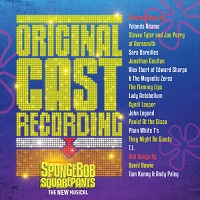 Original Cast, 2017 (Masterworks Broadway)
Original Cast, 2017 (Masterworks Broadway)  (4 / 5) The Spongebob Squarepants album — recorded following the Chicago tryout, before most of the cast transferred to Broadway — succeeds largely through the strange emotive pull it enacts on audiencess who grew up on Nickelodeon. Has there been a more effectively nostalgic musical for the children of the late ’90s? But with a cast digging into impersonations of the TV show’s voice actors, this recording may not have great appeal for Spongebob neophytes. A bevy of songwriters was brought aboard to contribute individual songs to this score, and without director Tina Landau’s unifying stage vision, all of that genre-hopping makes for a bit of a weird listen. (A Cyndi Lauper bop precedes a hymn of praise from gospel artist Yolanda Adams, for example.) But even if the score as a whole feels piecemeal in this context, there are plenty of buoyantly fun tracks on the album. The opening “Bikini Bottom Day,” by Jonathan Coulton, is an especially whimsical earworm with a convincing musical theater structure. Sara Bareilles surprises with a winningly anthemic pirate waltz (“Dentists hate pirate insurance / Which is why we’ve so many gold teeth”), and no less a personage than John Legend provides the show’s only slow ballad, “Miss You,” a sweet duet. Most of the songs for the supporting characters — Carlos López’s Mr. Krabs, Lilli Cooper’s Sandy, and Nick Blaemire’s Plankton — are skippable, while a friendship song for Spongebob and Patrick, “BFF” by Plain White T’s, pales in comparison to a similarly purposed ditty that was introduced on the TV show, “The F.U.N. Song.” But in the titular role, Ethan Slater infuses his uncanny impression with a lovely warmth. Emmy Raver-Lampman also makes a mighty impression as the high-belting whale Pearl. Arranger and orchestrator Tom Kitt is the real MVP of the album, maintaining a joyfully silly tone rooted in musical theater earnestness throughout while surfing musical styles. The score offers lots of auditory in-jokes for Spongebob fans — even the orchestrations and specific instrumentation choices are delightfully referential. And if Spongebob skeptics may be less than fully invested in the storyline, the recording is produced with a glistening mix that makes for a consistently enjoyable listen. — Dan Rubins
(4 / 5) The Spongebob Squarepants album — recorded following the Chicago tryout, before most of the cast transferred to Broadway — succeeds largely through the strange emotive pull it enacts on audiencess who grew up on Nickelodeon. Has there been a more effectively nostalgic musical for the children of the late ’90s? But with a cast digging into impersonations of the TV show’s voice actors, this recording may not have great appeal for Spongebob neophytes. A bevy of songwriters was brought aboard to contribute individual songs to this score, and without director Tina Landau’s unifying stage vision, all of that genre-hopping makes for a bit of a weird listen. (A Cyndi Lauper bop precedes a hymn of praise from gospel artist Yolanda Adams, for example.) But even if the score as a whole feels piecemeal in this context, there are plenty of buoyantly fun tracks on the album. The opening “Bikini Bottom Day,” by Jonathan Coulton, is an especially whimsical earworm with a convincing musical theater structure. Sara Bareilles surprises with a winningly anthemic pirate waltz (“Dentists hate pirate insurance / Which is why we’ve so many gold teeth”), and no less a personage than John Legend provides the show’s only slow ballad, “Miss You,” a sweet duet. Most of the songs for the supporting characters — Carlos López’s Mr. Krabs, Lilli Cooper’s Sandy, and Nick Blaemire’s Plankton — are skippable, while a friendship song for Spongebob and Patrick, “BFF” by Plain White T’s, pales in comparison to a similarly purposed ditty that was introduced on the TV show, “The F.U.N. Song.” But in the titular role, Ethan Slater infuses his uncanny impression with a lovely warmth. Emmy Raver-Lampman also makes a mighty impression as the high-belting whale Pearl. Arranger and orchestrator Tom Kitt is the real MVP of the album, maintaining a joyfully silly tone rooted in musical theater earnestness throughout while surfing musical styles. The score offers lots of auditory in-jokes for Spongebob fans — even the orchestrations and specific instrumentation choices are delightfully referential. And if Spongebob skeptics may be less than fully invested in the storyline, the recording is produced with a glistening mix that makes for a consistently enjoyable listen. — Dan RubinsThe Show Goes On: A Portfolio of Theater Songs by Tom Jones and Harvey Schmidt
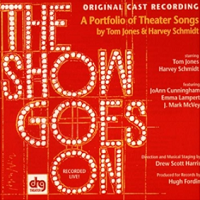 Off-Broadway Cast, 1998 (DRG)
Off-Broadway Cast, 1998 (DRG)  (3 / 5) There are plenty of small delights — simple little things, one might say — to be found in this live recording of the York Theatre Company’s revue, in which lyricist Tom Jones and composer Harvey Schmidt (The Fantasticks, 110 in the Shade, I Do, I Do!, Celebration) offer us a tour through their back catalog. (Suffice it to say this is not an album that will make much sense to anyone who doesn’t know “Soon It’s Gonna Rain” from the “The Rain Song.”) Vocally speaking, none of the three singers — Emma Lampert, Mark McVey, and JoAnn Cunningham — who join the pair of writers offer definitive performances of the well-known songs. And Jones and Schmidt regrettably sing together only for a few of their thinner creations, for example the title number, “The Show Goes On,” from the little-known musical Mirette. But it’s still a thrill to hear Schmidt play piano throughout, especially his impressionist delicacy on “Simple Little Things.” Jones, meanwhile, is the mischievous emcee, gleefully self-effacing (“There are other songs that are more like unrefrigerated fish; they tend to date rather rapidly”) and generous in sharing behind-the-scenes lore. Thrown in here are three different versions of 110 in the Shade’s “Raunchy,” written for various stars who had been courted for that show (including Mary Martin and Carol Burnett), as well as three different melodies for the title song of I Do, I Do! And, despite McVey’s tendency to over-sing, the loveliest surprise on the album is a gorgeous early ballad, “I Know Loneliness Quite Well,” which should be ranked right at the top of Jones and Schmidt’s formidable output. — Dan Rubins
(3 / 5) There are plenty of small delights — simple little things, one might say — to be found in this live recording of the York Theatre Company’s revue, in which lyricist Tom Jones and composer Harvey Schmidt (The Fantasticks, 110 in the Shade, I Do, I Do!, Celebration) offer us a tour through their back catalog. (Suffice it to say this is not an album that will make much sense to anyone who doesn’t know “Soon It’s Gonna Rain” from the “The Rain Song.”) Vocally speaking, none of the three singers — Emma Lampert, Mark McVey, and JoAnn Cunningham — who join the pair of writers offer definitive performances of the well-known songs. And Jones and Schmidt regrettably sing together only for a few of their thinner creations, for example the title number, “The Show Goes On,” from the little-known musical Mirette. But it’s still a thrill to hear Schmidt play piano throughout, especially his impressionist delicacy on “Simple Little Things.” Jones, meanwhile, is the mischievous emcee, gleefully self-effacing (“There are other songs that are more like unrefrigerated fish; they tend to date rather rapidly”) and generous in sharing behind-the-scenes lore. Thrown in here are three different versions of 110 in the Shade’s “Raunchy,” written for various stars who had been courted for that show (including Mary Martin and Carol Burnett), as well as three different melodies for the title song of I Do, I Do! And, despite McVey’s tendency to over-sing, the loveliest surprise on the album is a gorgeous early ballad, “I Know Loneliness Quite Well,” which should be ranked right at the top of Jones and Schmidt’s formidable output. — Dan Rubins
Some Like It Hot
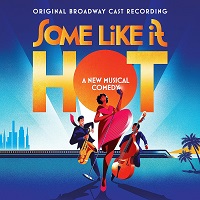 Original Broadway Cast, 2023 (Concord Theatricals)
Original Broadway Cast, 2023 (Concord Theatricals)  (2 / 5) Broadway musicals based on movies are nothing new, but Billy Wilder’s masterpiece Some Like it Hot may hold the distinction of being the only movie to serve as the basis for two Broadway musicals. First, there was Jule Styne, Bob Merrill, and Peter Stone’s attempt in 1972, resulting in the inoffensive but unimpressive Sugar. And now, 50 years later, Marc Shaiman and Scott Wittman, working in collaboration with book writers Matthew Lopez and Amber Ruffin, have taken their shot. Shaiman and Wittman brought an electrifying originality to their stellar pastiche score for Hairspray, so the duo might have seemed a perfect fit to write a ’20s-era jazz score with a modern twist. The Lopez/Ruffin book aims to expand upon the movie’s themes of gender and sexuality with more currency, and an excitingly diverse cast has been assembled this time around, so the new version appeared to have all the ingredients necessary to supplant 1972’s missed opportunity. And yet, it still doesn’t make a strong enough case for musicalizing the source material. Shaiman and Wittman’s lyrics are as succinct and cheeky as ever (“You Can’t Have Me If You Don’t Have Him,” “Poor Little Millionaire”), but Shaiman’s music lacks identity; if everything sounds enjoyable in a pastiche way, nothing sounds distinctive. While the cast album gets off to a fun, hyper start with “What are You Thirsty For?”, each song that follows insists on maintaining that same level of energy, so the score soon begins to sound frenetic as the songs blend together and/or remind you of jingles from the past. (The title song bears a very strong resemblance to the theme song from the old animated TV show Huckleberry Hound.) And though Charlie Rosen and Bryan Carter’s orchestrations are properly splashy and broad, they lack the steam that makes jazz of the ’20s special. Some of the cast members do strong work, J. Harrison Ghee scoring with Jerry/Daphne’s Act 2 showstopper “You Coulda Knocked Me Over With a Feather” and Kevin Del Aguila perfect as the impish millionaire Osgood in “Let’s Be Bad.” Less successful are Christian Borle as Joe/Josephine and Adrianna Hicks as Sugar Kane; while Borle is always an entertaining presence, he’s rather miscast as the caddish Joe, and Hicks comes across as too polished for the messy Sugar. It’s also unfortunate that Shaiman and Wittman felt the need to make Hicks reach for the rafters of her upper register in the final verse of every one of Sugar’s songs, such as “A Darker Shade of Blue” and “Ride Out the Storm.” Even though Hicks handles it all with ease and aplomb, it would’ve been nice to hear more of Sugar’s vulnerability in softer, more lyrical singing. But that, in a nut shell, is what keeps this score from taking off: It’s so eager to get hot that it never stops to consider when it can relax and simmer instead of boil and bubble. — Matt Koplik
(2 / 5) Broadway musicals based on movies are nothing new, but Billy Wilder’s masterpiece Some Like it Hot may hold the distinction of being the only movie to serve as the basis for two Broadway musicals. First, there was Jule Styne, Bob Merrill, and Peter Stone’s attempt in 1972, resulting in the inoffensive but unimpressive Sugar. And now, 50 years later, Marc Shaiman and Scott Wittman, working in collaboration with book writers Matthew Lopez and Amber Ruffin, have taken their shot. Shaiman and Wittman brought an electrifying originality to their stellar pastiche score for Hairspray, so the duo might have seemed a perfect fit to write a ’20s-era jazz score with a modern twist. The Lopez/Ruffin book aims to expand upon the movie’s themes of gender and sexuality with more currency, and an excitingly diverse cast has been assembled this time around, so the new version appeared to have all the ingredients necessary to supplant 1972’s missed opportunity. And yet, it still doesn’t make a strong enough case for musicalizing the source material. Shaiman and Wittman’s lyrics are as succinct and cheeky as ever (“You Can’t Have Me If You Don’t Have Him,” “Poor Little Millionaire”), but Shaiman’s music lacks identity; if everything sounds enjoyable in a pastiche way, nothing sounds distinctive. While the cast album gets off to a fun, hyper start with “What are You Thirsty For?”, each song that follows insists on maintaining that same level of energy, so the score soon begins to sound frenetic as the songs blend together and/or remind you of jingles from the past. (The title song bears a very strong resemblance to the theme song from the old animated TV show Huckleberry Hound.) And though Charlie Rosen and Bryan Carter’s orchestrations are properly splashy and broad, they lack the steam that makes jazz of the ’20s special. Some of the cast members do strong work, J. Harrison Ghee scoring with Jerry/Daphne’s Act 2 showstopper “You Coulda Knocked Me Over With a Feather” and Kevin Del Aguila perfect as the impish millionaire Osgood in “Let’s Be Bad.” Less successful are Christian Borle as Joe/Josephine and Adrianna Hicks as Sugar Kane; while Borle is always an entertaining presence, he’s rather miscast as the caddish Joe, and Hicks comes across as too polished for the messy Sugar. It’s also unfortunate that Shaiman and Wittman felt the need to make Hicks reach for the rafters of her upper register in the final verse of every one of Sugar’s songs, such as “A Darker Shade of Blue” and “Ride Out the Storm.” Even though Hicks handles it all with ease and aplomb, it would’ve been nice to hear more of Sugar’s vulnerability in softer, more lyrical singing. But that, in a nut shell, is what keeps this score from taking off: It’s so eager to get hot that it never stops to consider when it can relax and simmer instead of boil and bubble. — Matt Koplik
Shucked
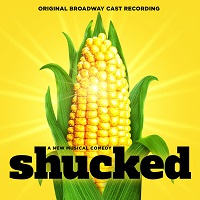 Original Broadway Cast, 2023 (Masterworks Broadway)
Original Broadway Cast, 2023 (Masterworks Broadway)  (3 / 5) Not every musical starts its cast album with the pre-show announcement. But, for better and for worse, Shucked is not every musical. The score, penned by country music veterans Brandy Clark and Shane MacAnally for their first Broadway outing, uses unabashed exposition throughout the first two songs to begin this musical tale set in Cobb County — a small town “that time forgot,” whose main import, export, and hobby is corn. The tone for the show is established in a peppy ode to that very vegetable. (Sample lyric: “It’s the same comin’ in as goin’ out!”) The main disappointment of this recording is that it can’t include the hilarious book by Robert Horn, filled to the brim with puns and one-liners, and hence loses much of the show’s charm. After the two narrators, who sarcastically help set up and comment on the story in a manner akin to Janis and Damian in Mean Girls (Grey Henson, who originated the role of Damian, even portrays Narrator 2), the first character we meet is the innocent heroine, Maizy. (Get it? I thought you might.) Caroline Innerbichler, who plays this role, has a singing voice with a charming, open twang that nicely fits the genre. The first act zips through a farcical story about a hack doctor whom Maizy brings from Tampa to Cobb County to “save the corn,” which for some reason started dying as soon as she was to get married. Plotting is not one of the strengths of Shucked, but listeners can surely lose themselves in the dreamy, husky (no pun intended) voice of Andrew Durand as Maizy’s love interest, Beau, and in the thrilling delivery of “Independently Owned” by Alex Newell as her cousin Lulu. While it’s true that the score for the first act is comprised almost entirely of “I am” and “I want” songs for the various characters, these performers are so uniquely talented that they make it all work. It’s the penultimate song of Act I, “Maybe Love,” that reveals a major problem ahead; in it, the writers begin to fully fall back on country-western cliches. As such, Act II is unfortunately bland, and although Newell’s return seems to promise more delights, he proves to be better at selling a solo number than holding up his half of a duet. The show’s conclusion is somewhat predictable, but a twist was not to be expected from this self-consciously folksy story. Bonus tracks offer the songwriters performing the two most thoroughly country-style numbers in the score; they put them across perfectly, but musical comedy writing is clearly not this team’s forte. — Charles Kirsch
(3 / 5) Not every musical starts its cast album with the pre-show announcement. But, for better and for worse, Shucked is not every musical. The score, penned by country music veterans Brandy Clark and Shane MacAnally for their first Broadway outing, uses unabashed exposition throughout the first two songs to begin this musical tale set in Cobb County — a small town “that time forgot,” whose main import, export, and hobby is corn. The tone for the show is established in a peppy ode to that very vegetable. (Sample lyric: “It’s the same comin’ in as goin’ out!”) The main disappointment of this recording is that it can’t include the hilarious book by Robert Horn, filled to the brim with puns and one-liners, and hence loses much of the show’s charm. After the two narrators, who sarcastically help set up and comment on the story in a manner akin to Janis and Damian in Mean Girls (Grey Henson, who originated the role of Damian, even portrays Narrator 2), the first character we meet is the innocent heroine, Maizy. (Get it? I thought you might.) Caroline Innerbichler, who plays this role, has a singing voice with a charming, open twang that nicely fits the genre. The first act zips through a farcical story about a hack doctor whom Maizy brings from Tampa to Cobb County to “save the corn,” which for some reason started dying as soon as she was to get married. Plotting is not one of the strengths of Shucked, but listeners can surely lose themselves in the dreamy, husky (no pun intended) voice of Andrew Durand as Maizy’s love interest, Beau, and in the thrilling delivery of “Independently Owned” by Alex Newell as her cousin Lulu. While it’s true that the score for the first act is comprised almost entirely of “I am” and “I want” songs for the various characters, these performers are so uniquely talented that they make it all work. It’s the penultimate song of Act I, “Maybe Love,” that reveals a major problem ahead; in it, the writers begin to fully fall back on country-western cliches. As such, Act II is unfortunately bland, and although Newell’s return seems to promise more delights, he proves to be better at selling a solo number than holding up his half of a duet. The show’s conclusion is somewhat predictable, but a twist was not to be expected from this self-consciously folksy story. Bonus tracks offer the songwriters performing the two most thoroughly country-style numbers in the score; they put them across perfectly, but musical comedy writing is clearly not this team’s forte. — Charles Kirsch
Soft Power
 Original Off-Broadway Cast, 2020 (Ghostlight)
Original Off-Broadway Cast, 2020 (Ghostlight)  (2 / 5) If this cast album confuses some listeners, that may be because they don’t understand the show’s central conceit, and can you blame them? It’s pretty much impossible to glean from the recording. This reviewer had to read several synopses of Soft Power before understanding that, essentially, the content of the show and the album is the result of a fever dream had by DHH — a character unsubtly named after the show’s librettist/lyricist, David Henry Hwang, and played here by Francis Jue. After being commissioned by a Chinese producer, Xue Xing, to write a musical, DHH gets stabbed in an act of racial violence, as Hwang did in real life, and goes into a coma in which he imagines a reverse King and I wherein a fictionalized Xue Xing comes to America and falls in love with (who else?) Hillary Clinton. This gimmicky concept could probably hold up for the length of, say, a Saturday Night Live skit; but Hwang and the show’s composer, Jeanine Tesori, here parodying the expansive style of the golden age Broadway musical, have trouble sustaining it for almost the entirety of the piece. At the beginning, the comical “Welcome to America,” featuring a painfully awkward rap that references Dirty Harry and Rolex, may elicit a few chuckles, and “Election Night,” which attempts to explain the messiness of the Electoral College system in Schoolhouse Rock-like fashion, might prompt a smile or two. But “It Takes Time,” a belabored parody of “Shall We Dance?” in which Xue attempts to teach Hillary the basic points of Mandarin, and “The New Silk Road,” an overlong battle cry in which Xue convinces the American people to lay down their guns and learn from China’s example, will likely make the listener feel as if the concept has gone on way too long. One of the strengths of this recording, though, is Conrad Ricamora, who lends a velvety, confident voice to the role of Xue and single-handedly holds the album together. Alyse Alan Louis does an admirable job of voicing Hillary, although she can’t quite sell the watered-down, bluesy “Rose’s Turn” takeoff titled “Song of the Campaign.” It could be largely because of the difference in perspective from 2023 (when this review was written) as compared to 2020 (when Soft Power was produced and this album was recorded), but all of the references to America’s “Dear Leader” now feel more like sad punches in the gut than incisive, comic observations. In the final and perhaps most jarring tonal shift, the show’s closing number, “Democracy” seems to be almost congratulating the audience on their progress and promising them a better future, thereby undermining the cynicism of the entire piece. In sum, this cast album has the soft power to occasionally entertain but lacks the ability to send a serious message. — Charles Kirsch
(2 / 5) If this cast album confuses some listeners, that may be because they don’t understand the show’s central conceit, and can you blame them? It’s pretty much impossible to glean from the recording. This reviewer had to read several synopses of Soft Power before understanding that, essentially, the content of the show and the album is the result of a fever dream had by DHH — a character unsubtly named after the show’s librettist/lyricist, David Henry Hwang, and played here by Francis Jue. After being commissioned by a Chinese producer, Xue Xing, to write a musical, DHH gets stabbed in an act of racial violence, as Hwang did in real life, and goes into a coma in which he imagines a reverse King and I wherein a fictionalized Xue Xing comes to America and falls in love with (who else?) Hillary Clinton. This gimmicky concept could probably hold up for the length of, say, a Saturday Night Live skit; but Hwang and the show’s composer, Jeanine Tesori, here parodying the expansive style of the golden age Broadway musical, have trouble sustaining it for almost the entirety of the piece. At the beginning, the comical “Welcome to America,” featuring a painfully awkward rap that references Dirty Harry and Rolex, may elicit a few chuckles, and “Election Night,” which attempts to explain the messiness of the Electoral College system in Schoolhouse Rock-like fashion, might prompt a smile or two. But “It Takes Time,” a belabored parody of “Shall We Dance?” in which Xue attempts to teach Hillary the basic points of Mandarin, and “The New Silk Road,” an overlong battle cry in which Xue convinces the American people to lay down their guns and learn from China’s example, will likely make the listener feel as if the concept has gone on way too long. One of the strengths of this recording, though, is Conrad Ricamora, who lends a velvety, confident voice to the role of Xue and single-handedly holds the album together. Alyse Alan Louis does an admirable job of voicing Hillary, although she can’t quite sell the watered-down, bluesy “Rose’s Turn” takeoff titled “Song of the Campaign.” It could be largely because of the difference in perspective from 2023 (when this review was written) as compared to 2020 (when Soft Power was produced and this album was recorded), but all of the references to America’s “Dear Leader” now feel more like sad punches in the gut than incisive, comic observations. In the final and perhaps most jarring tonal shift, the show’s closing number, “Democracy” seems to be almost congratulating the audience on their progress and promising them a better future, thereby undermining the cynicism of the entire piece. In sum, this cast album has the soft power to occasionally entertain but lacks the ability to send a serious message. — Charles Kirsch
Rocky
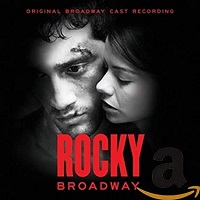 Original Broadway Cast, 2014 (UMe)
Original Broadway Cast, 2014 (UMe)  (3 / 5) Rocky finds Lynn Ahrens and Stephen Flaherty writing to order. At the center of this adaptation are two songs, from the film on which the musical is based and one of its sequels, that A&F had nothing to do with creating — ”Gonna Fly Now” (the iconic Rocky theme) and “Eye of the Tiger” (a big hit from Rocky III) — and the rest of the score seems forced to coalesce around those famous workout anthems. Most of the songs about boxing are undistinguished and indistinguishable from one another, recalling the film soundtracks as best they can. It’s a small miracle, then, that Ahrens and Flaherty, carve out space for a lovely collection of other songs charting the tenderly tentative relationship of the down-on-his-luck boxer Rocky Balboa (Andy Karl) and the traumatized Adrian (Margo Seibert). As heard on the cast album, Seibert is stunning in the brief self-empowerment ballad “I’m Done,” and the pair are sweetly hesitant in the skating rink waltz “The Flip Side.” A&F gave themselves an additional challenge in writing so much material for the under-educated and semi-literate Rocky; for example, the halting “Adrian” feelingly showcases the pair’s gifts at writing for specific characters as it tests the limits of the protagonist’s verbal self-expression. Best of all, though, is Adrian’s “Raining,” one of Ahrens’ most haunting lyrics set to a surging, churning melody, tinged with electric guitar licks, that sounds unlike anything else Flaherty has penned. Too often, this score treads water until the next training montage, but with so much distraction in the ring, credit the writers with landing at least one knockout punch. — Dan Rubins
(3 / 5) Rocky finds Lynn Ahrens and Stephen Flaherty writing to order. At the center of this adaptation are two songs, from the film on which the musical is based and one of its sequels, that A&F had nothing to do with creating — ”Gonna Fly Now” (the iconic Rocky theme) and “Eye of the Tiger” (a big hit from Rocky III) — and the rest of the score seems forced to coalesce around those famous workout anthems. Most of the songs about boxing are undistinguished and indistinguishable from one another, recalling the film soundtracks as best they can. It’s a small miracle, then, that Ahrens and Flaherty, carve out space for a lovely collection of other songs charting the tenderly tentative relationship of the down-on-his-luck boxer Rocky Balboa (Andy Karl) and the traumatized Adrian (Margo Seibert). As heard on the cast album, Seibert is stunning in the brief self-empowerment ballad “I’m Done,” and the pair are sweetly hesitant in the skating rink waltz “The Flip Side.” A&F gave themselves an additional challenge in writing so much material for the under-educated and semi-literate Rocky; for example, the halting “Adrian” feelingly showcases the pair’s gifts at writing for specific characters as it tests the limits of the protagonist’s verbal self-expression. Best of all, though, is Adrian’s “Raining,” one of Ahrens’ most haunting lyrics set to a surging, churning melody, tinged with electric guitar licks, that sounds unlike anything else Flaherty has penned. Too often, this score treads water until the next training montage, but with so much distraction in the ring, credit the writers with landing at least one knockout punch. — Dan Rubins
A Strange Loop
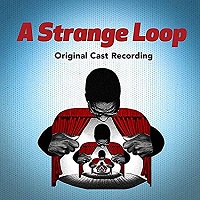 Original Off-Broadway Cast, 2019 (Yellow Sound)
Original Off-Broadway Cast, 2019 (Yellow Sound)  (4 / 5) How to describe A Strange Loop, the Pulitzer-Prize winning musical that gets its title from both a cognitive science term and a Liz Phair song? It’s messy, it’s brilliant, and every theater fan should pay attention to it. Written by Michael R. Jackson, this semi-autobiographical work has no structured plot and is chock-full of content so gleefully explicit, and often discomforting, that it makes shows like Spring Awakening and Book of Mormon look like after-school specials. The show focuses on Usher (Larry Owens), a self-described “fat, black and queer” aspiring musical theater writer who’s working on his newest musical — which also happens to be called “A Strange Loop” and just so happens to be about a fat, black, queer musical theater writer who’s writing a musical about a fat, black, queer musical theater writer. As he struggles with the creative process, Usher wonders if his lack of success as a writer and in acquiring a romantic partner is due to the cruelty and prejudice of the entertainment industry and the world at large, or due to his own trauma and lack of self worth. Jackson uses the musical as a large canvas to explore these and other matters with humor, humanity, and brutal honesty. Songs such as “Exile in Gayville” and “Tyler Perry Writes Real Life” include enough vulgarity and confrontation to put off many listeners, but Jackson’s lyrics are concise, intelligent, and razor-sharp. While his music is not quite so bold, and he sometimes doesn’t end his songs effectively, he has written a melodic, multi-faceted score with tight vocal arrangements (by Jackson) and flexible orchestrations (by Charlie Rosen). The ensemble is made up of Usher’s six main Thoughts, vocalizing his inner demons as well as all of the people in his life — family, agents, even pillars of Black American history. All of the performers heard here as the Thoughts are exceptional, but it’s Owens who commands the recording. His Usher is a ball of flaming, dramatic chaos, thrilling and terrifying. His expressive voice powers through the score, constantly fighting to stay afloat until it softly lands to safety towards the end in “Memory Song.” Owens also turns “Writing a Gospel Play,” in which Usher barely hides his contempt at concocting a script for Tyler Perry, into a comedic tour-de-force. A Strange Loop is not a show or cast album that can be recommended to everyone; it refuses to pander with vague affirmations or self-empowering anthems, and it’s all the more interesting for that reason. — Matt Koplik
(4 / 5) How to describe A Strange Loop, the Pulitzer-Prize winning musical that gets its title from both a cognitive science term and a Liz Phair song? It’s messy, it’s brilliant, and every theater fan should pay attention to it. Written by Michael R. Jackson, this semi-autobiographical work has no structured plot and is chock-full of content so gleefully explicit, and often discomforting, that it makes shows like Spring Awakening and Book of Mormon look like after-school specials. The show focuses on Usher (Larry Owens), a self-described “fat, black and queer” aspiring musical theater writer who’s working on his newest musical — which also happens to be called “A Strange Loop” and just so happens to be about a fat, black, queer musical theater writer who’s writing a musical about a fat, black, queer musical theater writer. As he struggles with the creative process, Usher wonders if his lack of success as a writer and in acquiring a romantic partner is due to the cruelty and prejudice of the entertainment industry and the world at large, or due to his own trauma and lack of self worth. Jackson uses the musical as a large canvas to explore these and other matters with humor, humanity, and brutal honesty. Songs such as “Exile in Gayville” and “Tyler Perry Writes Real Life” include enough vulgarity and confrontation to put off many listeners, but Jackson’s lyrics are concise, intelligent, and razor-sharp. While his music is not quite so bold, and he sometimes doesn’t end his songs effectively, he has written a melodic, multi-faceted score with tight vocal arrangements (by Jackson) and flexible orchestrations (by Charlie Rosen). The ensemble is made up of Usher’s six main Thoughts, vocalizing his inner demons as well as all of the people in his life — family, agents, even pillars of Black American history. All of the performers heard here as the Thoughts are exceptional, but it’s Owens who commands the recording. His Usher is a ball of flaming, dramatic chaos, thrilling and terrifying. His expressive voice powers through the score, constantly fighting to stay afloat until it softly lands to safety towards the end in “Memory Song.” Owens also turns “Writing a Gospel Play,” in which Usher barely hides his contempt at concocting a script for Tyler Perry, into a comedic tour-de-force. A Strange Loop is not a show or cast album that can be recommended to everyone; it refuses to pander with vague affirmations or self-empowering anthems, and it’s all the more interesting for that reason. — Matt Koplik
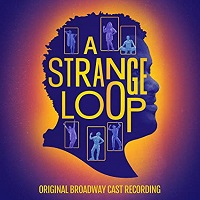 Original Broadway Cast, 2022 (Ghostlight/Yellow Sound)
Original Broadway Cast, 2022 (Ghostlight/Yellow Sound)  (3 / 5) Despite A Strange Loop having had a sold-out run Off-Broadway, winning the Pulitzer Prize, and sweeping all other eligible awards during its season, a transfer to Broadway was not a foregone conclusion. The musical was always going to be a hard sell to a mainstream audience, and the big question for fans of Jackson’s work was: If there is a transfer, will the creative team make any alterations to render the abrasive material more palatable? The answer, as evidenced by this new cast recording, is mostly “no.” A few of the rougher edges have been smoothed over, as in “Inwood Daddy,” but even a slightly toned-down Loop is more shocking and confrontational than 99% of shows that land on Broadway. Some of Jackson’s rewrites make certain lyrics slightly more clear to the audience, though not necessarily easier to take. Where the Broadway transfer and the resulting album lose a great deal of power are in the sound design and the new central performance; the second recording sounds mushier and more echo-y than the first one, making many of the lyrics difficult to decipher, while some of the voices are imbalanced and poorly blended. And although Jaquel Spivey brings pop panache and vocal ease to the role of Usher, his performance is less expressive and explosive than Owens’. This Usher feels more controlled and tempered, which ultimately dilutes the power of the piece. Still, Spivey is vocally well qualified for the role, and some listeners might prefer him to Owens in that regard. A Strange Loop went on to garner more critical acclaim for its Broadway bow, winning the Tony for Best Musical in 2022, though it has continued to struggle at the box office even after earning that honor. This recording is a strong representation of why the show deserves its accolades, even as it also displays what was lost in the move to Broadway. — M.K.
(3 / 5) Despite A Strange Loop having had a sold-out run Off-Broadway, winning the Pulitzer Prize, and sweeping all other eligible awards during its season, a transfer to Broadway was not a foregone conclusion. The musical was always going to be a hard sell to a mainstream audience, and the big question for fans of Jackson’s work was: If there is a transfer, will the creative team make any alterations to render the abrasive material more palatable? The answer, as evidenced by this new cast recording, is mostly “no.” A few of the rougher edges have been smoothed over, as in “Inwood Daddy,” but even a slightly toned-down Loop is more shocking and confrontational than 99% of shows that land on Broadway. Some of Jackson’s rewrites make certain lyrics slightly more clear to the audience, though not necessarily easier to take. Where the Broadway transfer and the resulting album lose a great deal of power are in the sound design and the new central performance; the second recording sounds mushier and more echo-y than the first one, making many of the lyrics difficult to decipher, while some of the voices are imbalanced and poorly blended. And although Jaquel Spivey brings pop panache and vocal ease to the role of Usher, his performance is less expressive and explosive than Owens’. This Usher feels more controlled and tempered, which ultimately dilutes the power of the piece. Still, Spivey is vocally well qualified for the role, and some listeners might prefer him to Owens in that regard. A Strange Loop went on to garner more critical acclaim for its Broadway bow, winning the Tony for Best Musical in 2022, though it has continued to struggle at the box office even after earning that honor. This recording is a strong representation of why the show deserves its accolades, even as it also displays what was lost in the move to Broadway. — M.K.
Six
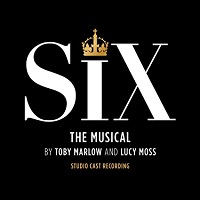 Studio Cast, 2019 (Absolute)
Studio Cast, 2019 (Absolute)  (3 / 5) Part history lesson, part Coachella, SIX gives cheeky insight into the lives of the six wives of Henry VIII in the form of a concert, with the women performing as a pop girl group and each one getting a song to represent herself to the audience. The musical has no concrete plot. Instead, as conceived by writers Toby Marlow and Lucy Moss, it plays out like a mix tape of various contemporary music genres; each wife has a song that tells her story, plus there’s an opening number (“Ex-Wives”) and a finale (“Six”) that thematically connects them all. When this concept recording was released online, it garnered a large fan following and prompted multiple productions of the show around the world. Because the concept album is designed to sound like a traditional pop/R&B album rather than a cast recording, some listeners may be turned off by the over-produced sound mixing and the breathy affectations of several of the vocalists. But don’t be disillusioned by the sheen of this pop presentation: SIX is a strong musical theater score. Marlow and Moss’ lyrics are creative and clever, and their songs naturally channel modern-day pop, a genre that has largely eluded Broadway composers until now. For example, “Don’t Lose Ur Head” (chronicling the rise and fall of Anne Boleyn) and “All You Wanna Do” (re-claiming the narrative of Katherine Howard) bring to mind the bubble-gum ear worms of Avril Lavigne and Katy Perry, while ballads such as Jane Seymour’s “Heart of Stone” could easily fit into an Adele album. Still, it will be difficult for some to listen to this concept album and be able to embrace SIX as a musical theater score. But there is an alternative… — Matt Koplik
(3 / 5) Part history lesson, part Coachella, SIX gives cheeky insight into the lives of the six wives of Henry VIII in the form of a concert, with the women performing as a pop girl group and each one getting a song to represent herself to the audience. The musical has no concrete plot. Instead, as conceived by writers Toby Marlow and Lucy Moss, it plays out like a mix tape of various contemporary music genres; each wife has a song that tells her story, plus there’s an opening number (“Ex-Wives”) and a finale (“Six”) that thematically connects them all. When this concept recording was released online, it garnered a large fan following and prompted multiple productions of the show around the world. Because the concept album is designed to sound like a traditional pop/R&B album rather than a cast recording, some listeners may be turned off by the over-produced sound mixing and the breathy affectations of several of the vocalists. But don’t be disillusioned by the sheen of this pop presentation: SIX is a strong musical theater score. Marlow and Moss’ lyrics are creative and clever, and their songs naturally channel modern-day pop, a genre that has largely eluded Broadway composers until now. For example, “Don’t Lose Ur Head” (chronicling the rise and fall of Anne Boleyn) and “All You Wanna Do” (re-claiming the narrative of Katherine Howard) bring to mind the bubble-gum ear worms of Avril Lavigne and Katy Perry, while ballads such as Jane Seymour’s “Heart of Stone” could easily fit into an Adele album. Still, it will be difficult for some to listen to this concept album and be able to embrace SIX as a musical theater score. But there is an alternative… — Matt KoplikOriginal Broadway Cast, 2022 (6 Music Ltd.)  (4 / 5) Recorded live on opening night of the Broadway production of SIX, this album captures the show’s fervent energy and the score’s dramatic meat when it’s put in the hands of six smart and talented singing actresses. The crowd’s hyper-energetic response to “Ex-Wives”at the start may be overwhelming or frustrating for some listeners, but given that SIX’s opening was delayed for 18 months due to the COVID-19 pandemic, that response is understandable. Thereafter, the album focuses primarily on the performers, starting with Adrianna Hicks salivating over the Beyonce-inspired “No Way” and moving on non-stop from there. Each singing actress delivers in the pop/R&B style of the score while also infusing these songs with spice and personality. Andrea Masceat fills “Don’t Lose Ur Head” with “Ain’t I a stinker?” attitude, while Abby Mueller communicates pain through each melisma in “Heart of Stone.” Then there’s Brittney Mack delightfully showing off in “Get Down” and Samantha Pauly blending trauma with Ariana Grande-style power belting in “All You Wanna Do,” finally capped by Anna Uzele bringing cool and calm to “I Don’t Need Your Love.” The album includes pieces of dialogue to help string the songs together, and some extra music is included, making this a more complete representation of the score than the studio cast recording. SIX isn’t for everyone, but if you have a friend who’s on the fence about giving Marlow and Moss’ Gen Z song cycle a chance, this is the album to lend them. — M.K.
(4 / 5) Recorded live on opening night of the Broadway production of SIX, this album captures the show’s fervent energy and the score’s dramatic meat when it’s put in the hands of six smart and talented singing actresses. The crowd’s hyper-energetic response to “Ex-Wives”at the start may be overwhelming or frustrating for some listeners, but given that SIX’s opening was delayed for 18 months due to the COVID-19 pandemic, that response is understandable. Thereafter, the album focuses primarily on the performers, starting with Adrianna Hicks salivating over the Beyonce-inspired “No Way” and moving on non-stop from there. Each singing actress delivers in the pop/R&B style of the score while also infusing these songs with spice and personality. Andrea Masceat fills “Don’t Lose Ur Head” with “Ain’t I a stinker?” attitude, while Abby Mueller communicates pain through each melisma in “Heart of Stone.” Then there’s Brittney Mack delightfully showing off in “Get Down” and Samantha Pauly blending trauma with Ariana Grande-style power belting in “All You Wanna Do,” finally capped by Anna Uzele bringing cool and calm to “I Don’t Need Your Love.” The album includes pieces of dialogue to help string the songs together, and some extra music is included, making this a more complete representation of the score than the studio cast recording. SIX isn’t for everyone, but if you have a friend who’s on the fence about giving Marlow and Moss’ Gen Z song cycle a chance, this is the album to lend them. — M.K.
Spamilton
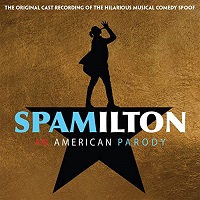 Original Off-Broadway Cast, 2017 (DRG)
Original Off-Broadway Cast, 2017 (DRG)  (5 / 5) Of course, you knew Gerard Alessandrini wasn’t going to leave Hamilton alone, but who would have predicted this? It’s a whole evening of Revolutionary spoofery, punctuated by multiple Forbidden Broadway-like riffs on other shows and stars of the day. And it works spectacularly well. Alessandrini’s engaging liner notes reveal his insecurity about learning to write rap and hip-hop, yet he appears to have mastered those forms thoroughly, betraying a show-tune sensibility only through his preciser-than-Lin-Manuel rhyming: “I’m getting nervouser, Sir/ Be terser in your verse, Sir/ You’re no Johnny Mercer.” After the briefest of full-orchestra intros, the music’s in the hands of Forbidden Broadway vet Fred Barton at the piano, and he supports one of the best casts Alessandrini was ever blessed with. How they manage to clearly utter every rapidly passing syllable, and land every joke, is a miracle. As Hamilton, Dan Rosales is Lin-Manuel Miranda with more voice. Chris Anthony Giles and Nicholas Edwards serve up wicked parodies of Leslie Odom, Jr. and Daveed Diggs. Glenn Bassett is King George in “Straight is Back,” Juwan Crawley plays all of the other guys, and in the women’s roles, Nora Schell is simply amazing; she transitions expertly and rapidly between Renée Elise Goldsberry and Philippa Soo with laser accuracy, also serving up delicious Bernadette and Audra cameos. (Her Barbra isn’t quite there yet.) Even Christine Pedi’s beloved Liza turns up for a funny “Down With Rap” turn. With virtually the entire Hamilton score lampooned, plus side trips into astute 2017 Broadway commentary and some outrageous musical-hybrid moments (An American Psycho in Paris, The Lion King and I), this album’s a nonstop party. — Marc Miller
(5 / 5) Of course, you knew Gerard Alessandrini wasn’t going to leave Hamilton alone, but who would have predicted this? It’s a whole evening of Revolutionary spoofery, punctuated by multiple Forbidden Broadway-like riffs on other shows and stars of the day. And it works spectacularly well. Alessandrini’s engaging liner notes reveal his insecurity about learning to write rap and hip-hop, yet he appears to have mastered those forms thoroughly, betraying a show-tune sensibility only through his preciser-than-Lin-Manuel rhyming: “I’m getting nervouser, Sir/ Be terser in your verse, Sir/ You’re no Johnny Mercer.” After the briefest of full-orchestra intros, the music’s in the hands of Forbidden Broadway vet Fred Barton at the piano, and he supports one of the best casts Alessandrini was ever blessed with. How they manage to clearly utter every rapidly passing syllable, and land every joke, is a miracle. As Hamilton, Dan Rosales is Lin-Manuel Miranda with more voice. Chris Anthony Giles and Nicholas Edwards serve up wicked parodies of Leslie Odom, Jr. and Daveed Diggs. Glenn Bassett is King George in “Straight is Back,” Juwan Crawley plays all of the other guys, and in the women’s roles, Nora Schell is simply amazing; she transitions expertly and rapidly between Renée Elise Goldsberry and Philippa Soo with laser accuracy, also serving up delicious Bernadette and Audra cameos. (Her Barbra isn’t quite there yet.) Even Christine Pedi’s beloved Liza turns up for a funny “Down With Rap” turn. With virtually the entire Hamilton score lampooned, plus side trips into astute 2017 Broadway commentary and some outrageous musical-hybrid moments (An American Psycho in Paris, The Lion King and I), this album’s a nonstop party. — Marc Miller
Sing Street
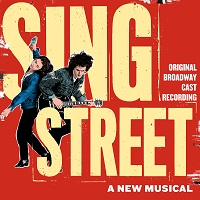 Original Broadway Cast, 2019 (Sony Masterworks Broadway)
Original Broadway Cast, 2019 (Sony Masterworks Broadway)  (4 / 5) First, a few words of explanation: The show that yielded this cast album opened Off-Broadway at the New York Theatre Workshop in December 2019. It was announced for a Broadway transfer even before the NYTW run ended — but then the COVID-19 crisis that began in the spring of 2020 scuttled those plans, indefinitely closing all theaters in New York City (and pretty much throughout the world). So even though this album literally has “Broadway” written all over it, we have no way of knowing at this writing if Sing Street will ever make it to The Street. At any rate, the show has a wonderfully infectious score, here preserved as one of the most compulsively listenable cast recordings in recent memory; and since all of the performers heard on the album were officially cast in the Broadway transfer of the show, the “Original Broadway Cast” designation is arguably not inaccurate. Based on a 2016 coming-of-age film set in Dublin in 1982, the musical features a generous handful of terrific songs that were originally written by Gary Clark and John Carney for that sweet indie flick, plus some new material. The opening track, “Just Can’t Get Enough,” gives us a happy hint that we’re going to be hearing lots of catchy up-tunes crafted in ’80s-rock style, with irresistible hooks. That certainly turns out to be true, as with such other cuts as “Drive It Like You Stole It,” “Brown Shoes,” “A Beautiful Sea,” and “Girls,” but there are also some lovely ballads (“Dream for You,” “Go Now”). Brenock O’Connor, in the central role of schoolboy/aspiring rock star Conor Lawlor, does a fine, authentic-sounding job with much of the solo singing on the album, and there are also worthy contributions from Zara Devlin as Raphina, a young model on whom Conor develops a major crush; Martin Moran as the authoritarian Brother Baxter; and Gus Halper as Conor’s troubled brother, Brendan (he does a beautiful job with “Go Now”). One of the best songs in the score, “Up,” is heard in two different versions — ballad and up-tempo, both highly enjoyable. At the end of the show, Conor leaves his family and his band to go with Raphina off to London, where they will seek their fortunes. Here’s hoping that the future will be bright for them and for this charming, affecting, lovable little musical. — M.P.
(4 / 5) First, a few words of explanation: The show that yielded this cast album opened Off-Broadway at the New York Theatre Workshop in December 2019. It was announced for a Broadway transfer even before the NYTW run ended — but then the COVID-19 crisis that began in the spring of 2020 scuttled those plans, indefinitely closing all theaters in New York City (and pretty much throughout the world). So even though this album literally has “Broadway” written all over it, we have no way of knowing at this writing if Sing Street will ever make it to The Street. At any rate, the show has a wonderfully infectious score, here preserved as one of the most compulsively listenable cast recordings in recent memory; and since all of the performers heard on the album were officially cast in the Broadway transfer of the show, the “Original Broadway Cast” designation is arguably not inaccurate. Based on a 2016 coming-of-age film set in Dublin in 1982, the musical features a generous handful of terrific songs that were originally written by Gary Clark and John Carney for that sweet indie flick, plus some new material. The opening track, “Just Can’t Get Enough,” gives us a happy hint that we’re going to be hearing lots of catchy up-tunes crafted in ’80s-rock style, with irresistible hooks. That certainly turns out to be true, as with such other cuts as “Drive It Like You Stole It,” “Brown Shoes,” “A Beautiful Sea,” and “Girls,” but there are also some lovely ballads (“Dream for You,” “Go Now”). Brenock O’Connor, in the central role of schoolboy/aspiring rock star Conor Lawlor, does a fine, authentic-sounding job with much of the solo singing on the album, and there are also worthy contributions from Zara Devlin as Raphina, a young model on whom Conor develops a major crush; Martin Moran as the authoritarian Brother Baxter; and Gus Halper as Conor’s troubled brother, Brendan (he does a beautiful job with “Go Now”). One of the best songs in the score, “Up,” is heard in two different versions — ballad and up-tempo, both highly enjoyable. At the end of the show, Conor leaves his family and his band to go with Raphina off to London, where they will seek their fortunes. Here’s hoping that the future will be bright for them and for this charming, affecting, lovable little musical. — M.P.
School of Rock
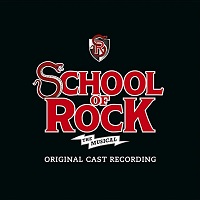 Original Broadway Cast, 2015 (Warner Bros.)
Original Broadway Cast, 2015 (Warner Bros.)  (3 / 5) Andrew Lloyd Webber found his greatest commercial success in the era of the British pop-opera blockbusters, so it’s easy to forget that he first made his mark in the musical theater world by using pop/rock music to groundbreaking effect in his scores for Jesus Christ Superstar and Evita. Which leads us to School of Rock, the first new Webber score to come to Broadway in a decade. Based on the 2003 film of the same title, starring Jack Black, the show tells of Dewey (Alex Brightman), a directionless man-child and rock and roll devotee who forms his own rock band with the children of a prestigious prep school where he has recently been working as a substitute teacher under false pretenses. While the score isn’t of the same quality as Evita or Superstar, partly due to Glenn Slater’s no more than serviceable lyrics, it’s certainly the most inventive and fun Webber’s been in years. As Dewey, Brightman has the same likeable charm Black offered on screen, as well as an exciting rock voice that’s up to the difficult demands of the role (a hallmark of Webber’s writing). As the school’s stern headmistress, Sierra Boggess is less successful, proving effective in classical moments such as her short snippet of Mozart’s “Queen of the Night” aria, but unable to negotiate her polished soprano around the contemporary elements of her breakout ballad, “Where Did the Rock Go.” The score is not a complete triumph for Webber; on the one hand, when Dewey and his students finally come together to create their band’s sound in the numbers “You’re in the Band” and “Stick it to the Man,” you can practically hear Webber’s giddiness, but in “When I Climb to the Top of Mount Rock” and “Children of Rock,” the composer goes overboard from the start, and the songs never have a chance to build. Note: School of Rock was recorded before the show began Broadway performances, and certain aspects of the cast album do not reflect the score as it is now. Most notably, “Give Up Your Dreams,” an unfunny anthem (though well performed by Mamie Parris), was cut in previews but is included here, along with a few bonus tracks at the end. — Matt Koplik
(3 / 5) Andrew Lloyd Webber found his greatest commercial success in the era of the British pop-opera blockbusters, so it’s easy to forget that he first made his mark in the musical theater world by using pop/rock music to groundbreaking effect in his scores for Jesus Christ Superstar and Evita. Which leads us to School of Rock, the first new Webber score to come to Broadway in a decade. Based on the 2003 film of the same title, starring Jack Black, the show tells of Dewey (Alex Brightman), a directionless man-child and rock and roll devotee who forms his own rock band with the children of a prestigious prep school where he has recently been working as a substitute teacher under false pretenses. While the score isn’t of the same quality as Evita or Superstar, partly due to Glenn Slater’s no more than serviceable lyrics, it’s certainly the most inventive and fun Webber’s been in years. As Dewey, Brightman has the same likeable charm Black offered on screen, as well as an exciting rock voice that’s up to the difficult demands of the role (a hallmark of Webber’s writing). As the school’s stern headmistress, Sierra Boggess is less successful, proving effective in classical moments such as her short snippet of Mozart’s “Queen of the Night” aria, but unable to negotiate her polished soprano around the contemporary elements of her breakout ballad, “Where Did the Rock Go.” The score is not a complete triumph for Webber; on the one hand, when Dewey and his students finally come together to create their band’s sound in the numbers “You’re in the Band” and “Stick it to the Man,” you can practically hear Webber’s giddiness, but in “When I Climb to the Top of Mount Rock” and “Children of Rock,” the composer goes overboard from the start, and the songs never have a chance to build. Note: School of Rock was recorded before the show began Broadway performances, and certain aspects of the cast album do not reflect the score as it is now. Most notably, “Give Up Your Dreams,” an unfunny anthem (though well performed by Mamie Parris), was cut in previews but is included here, along with a few bonus tracks at the end. — Matt Koplik
Rothschild and Sons
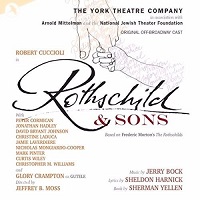 Off Broadway Cast, 2016 (Jay Records)
Off Broadway Cast, 2016 (Jay Records)  (3 / 5) Here is a major revisal of the 1970 musical The Rothschilds, cut down to one-act and including several previously unheard Jerry Bock-Sheldon Harnick songs, plus some revisions by Harnick. The romance for son Nathan and the big ensemble numbers are gone, and the political leaders’ roles have been trimmed. The cast totals 11, compared to more than 30 on Broadway; when Mayer Rothschild (Robert Cuccioli) sings a shortened version of “He Tossed a Coin,” it’s clear that the Frankfurt fair isn’t crowded. Joseph Church has reorchestrated the score for four players, compared to Don Walker’s sumptuous originals. What if anything in this York Theatre Company production compensates for the loss of size and spectacle of the original? Lyricist Harnick and librettist Sherman Yellen (composer Bock died in 2010) had long wanted to refocus the story on the Rothschild family and less on the sprawling European setting. In this, they succeeded; Rothschild and Sons is an intimate piece that emphasizes feelings and relationships. Mayer’s wife, Gutele — a moving Glory Crampton — is a more significant presence as the action unfolds through her memories. She grows from being satisfied with “One Room” to standing strong against Metternich in the reprise of the driving anthem “Everything.” Crampton also gets the best of the added songs, “Just A Map,” in which she frets over her sons as they crisscross wartime Europe. Nathan (Christopher M. Williams) has lost his silly patter number, but here he makes mistakes on arrival in England (“Tea’s Hot”) and then butts heads with his father in “He Never Listens.” The heart of the show is Mayer, the father. Cuccioli’s voice sounds terrific — his “In My Own Lifetime” is rousing — yet he lacks the warmth and humor that Hal Linden found in the character. On the one hand (as another Bock-Harnick character said), it’s wonderful that this revisal may grant new life to the show. But on the other hand, while there are plenty of musicals about families, how many are as daring as The Rothschilds — set in the chaos of late 18th-early 19th century Europe, about a family relying on financial maneuverings and political cunning to survive, with a rich score evoking late Baroque and classical masters? Stick with the original. — L.F.
(3 / 5) Here is a major revisal of the 1970 musical The Rothschilds, cut down to one-act and including several previously unheard Jerry Bock-Sheldon Harnick songs, plus some revisions by Harnick. The romance for son Nathan and the big ensemble numbers are gone, and the political leaders’ roles have been trimmed. The cast totals 11, compared to more than 30 on Broadway; when Mayer Rothschild (Robert Cuccioli) sings a shortened version of “He Tossed a Coin,” it’s clear that the Frankfurt fair isn’t crowded. Joseph Church has reorchestrated the score for four players, compared to Don Walker’s sumptuous originals. What if anything in this York Theatre Company production compensates for the loss of size and spectacle of the original? Lyricist Harnick and librettist Sherman Yellen (composer Bock died in 2010) had long wanted to refocus the story on the Rothschild family and less on the sprawling European setting. In this, they succeeded; Rothschild and Sons is an intimate piece that emphasizes feelings and relationships. Mayer’s wife, Gutele — a moving Glory Crampton — is a more significant presence as the action unfolds through her memories. She grows from being satisfied with “One Room” to standing strong against Metternich in the reprise of the driving anthem “Everything.” Crampton also gets the best of the added songs, “Just A Map,” in which she frets over her sons as they crisscross wartime Europe. Nathan (Christopher M. Williams) has lost his silly patter number, but here he makes mistakes on arrival in England (“Tea’s Hot”) and then butts heads with his father in “He Never Listens.” The heart of the show is Mayer, the father. Cuccioli’s voice sounds terrific — his “In My Own Lifetime” is rousing — yet he lacks the warmth and humor that Hal Linden found in the character. On the one hand (as another Bock-Harnick character said), it’s wonderful that this revisal may grant new life to the show. But on the other hand, while there are plenty of musicals about families, how many are as daring as The Rothschilds — set in the chaos of late 18th-early 19th century Europe, about a family relying on financial maneuverings and political cunning to survive, with a rich score evoking late Baroque and classical masters? Stick with the original. — L.F.
The Story of My Life
 Original Broadway Cast, 2009 (PS Classics)
Original Broadway Cast, 2009 (PS Classics)  (3 / 5) The Story of My Life is an intimate, unusual, two-character musical with songs by Neil Bartram and book by Brian Hill. The strengths of the cast album lie in two talented performers, a score that’s lovely, evocative, and emotional, and the show’s highly original premise about friendship and the art of creative writing. Yet that very premise also shackles the piece, for the audience isn’t sufficiently exposed to other aspects of the lives of the characters, creating distracting questions that are never fully answered. Thomas Weaver (Will Chase), a successful author, returns to his hometown to write the eulogy for his one-time best friend, Alvin Kelby (Malcolm Gets). Alvin appears in Thomas’s mind, taking him back to when a thoughtful first grade teacher brought them together (“Mrs. Remington”). The score soars in its early numbers, charting how the pair bond over a shared love of books (Alvin’s dad owns a bookstore) and the film It’s a Wonderful Life. Bartram displays a solid grasp of childhood perspective, and Chase and Gets — even as only heard on this recording — magically transform themselves into schoolboys, exchanging gifts and creating traditions. (Check out the way Chase’s voice cracks in “1876.”) When the boys hit adolescence, it hits back; Thomas rightly worries that Alvin’s “odd” behavior, including an obsession with his dead mother’s bathrobe, might not go over well in high school (“Normal”). Bartram and Hill subtly reveal the differences that will later fracture this friendship, but the show doesn’t work as well once the men reach adulthood. Thomas attends college, writes bestsellers, and gets engaged, while Alvin apparently has no existence beyond the bookstore. Thomas increasingly edits his friend out of his life, culminating in the shocking “Independence Day” — and then he develops writer’s block. He has rejected Alvin, so now his muse has abandoned him. Here’s where the questions start — not the one concerning Alvin’s death, which Bartram and Hill rightly keep a mystery, as it leads to Thomas’s catharsis. But what about Thomas’s fiancée, Ann? Unlike the brief but fully realized portraits of Mrs. Remington and Alvin’s parents, she’s a cipher. And are we supposed to accept that everything Thomas has written has derived from his experiences with Alvin? In the hands of less talented performers, this slight framework might crumble, but Chase keeps Thomas attractive even when he’s being a jerk, and Gets’s Alvin skillfully morphs from neurotic kid to crushed soul to the ghost whose nagging gets his friend back on track. — Laura Frankos
(3 / 5) The Story of My Life is an intimate, unusual, two-character musical with songs by Neil Bartram and book by Brian Hill. The strengths of the cast album lie in two talented performers, a score that’s lovely, evocative, and emotional, and the show’s highly original premise about friendship and the art of creative writing. Yet that very premise also shackles the piece, for the audience isn’t sufficiently exposed to other aspects of the lives of the characters, creating distracting questions that are never fully answered. Thomas Weaver (Will Chase), a successful author, returns to his hometown to write the eulogy for his one-time best friend, Alvin Kelby (Malcolm Gets). Alvin appears in Thomas’s mind, taking him back to when a thoughtful first grade teacher brought them together (“Mrs. Remington”). The score soars in its early numbers, charting how the pair bond over a shared love of books (Alvin’s dad owns a bookstore) and the film It’s a Wonderful Life. Bartram displays a solid grasp of childhood perspective, and Chase and Gets — even as only heard on this recording — magically transform themselves into schoolboys, exchanging gifts and creating traditions. (Check out the way Chase’s voice cracks in “1876.”) When the boys hit adolescence, it hits back; Thomas rightly worries that Alvin’s “odd” behavior, including an obsession with his dead mother’s bathrobe, might not go over well in high school (“Normal”). Bartram and Hill subtly reveal the differences that will later fracture this friendship, but the show doesn’t work as well once the men reach adulthood. Thomas attends college, writes bestsellers, and gets engaged, while Alvin apparently has no existence beyond the bookstore. Thomas increasingly edits his friend out of his life, culminating in the shocking “Independence Day” — and then he develops writer’s block. He has rejected Alvin, so now his muse has abandoned him. Here’s where the questions start — not the one concerning Alvin’s death, which Bartram and Hill rightly keep a mystery, as it leads to Thomas’s catharsis. But what about Thomas’s fiancée, Ann? Unlike the brief but fully realized portraits of Mrs. Remington and Alvin’s parents, she’s a cipher. And are we supposed to accept that everything Thomas has written has derived from his experiences with Alvin? In the hands of less talented performers, this slight framework might crumble, but Chase keeps Thomas attractive even when he’s being a jerk, and Gets’s Alvin skillfully morphs from neurotic kid to crushed soul to the ghost whose nagging gets his friend back on track. — Laura Frankos
The Scottsboro Boys
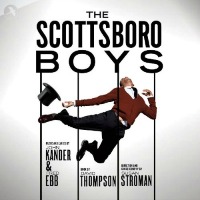 Original Off-Broadway Cast, 2010 (JAY)
Original Off-Broadway Cast, 2010 (JAY)  (5 / 5) In several of their shows, John Kander and Fred Ebb have used various types of entertainment as the contextual setting for exploring historical and social issues. In Cabaret, sleazy nightclub routines parallel the excesses of Weimar Germany and the rise of Nazism; Chicago‘s vaudeville acts reveal the corrupt justice system of the Roaring Twenties. In The Scottsboro Boys, the tragic story of nine young African Americans who were unjustly accused of raping two white women in 1931 is told in the form of a minstrel show. The result is a searing, brilliant work with depth, power, and guts. Kander says they chose the format for the opportunities it provided: an ensemble, led by an Interlocutor (John Cullum), telling stories, jokes and songs. Mr. Bones and Mr. Tambo (the versatile Colman Domingo and Forrest McClendon) assist by playing multiple characters (“White men’s our speciality”). Needless to say, the minstrel show itself is a stark reminder of racism, reinforcing social injustice with every number. In the rousing opener, the lead among the accused men, Haywood Patterson (the impressive Brandon Victor Dixon), asks “This time, can we tell it like it really happened?” The Interlocutor benignly replies, “Of course.” Haywood’s resolve to tell the truth provides the score with a constant refrain, from his first defense (the Bert Williams style “Nothin'”) to the comic fable “Make Friends With the Truth” to “Zat So?” His defiant cry “You Can’t Do Me” sets up the boys’ refusal of the Interlocutor’s call for a cakewalk and a “happy ending,” subverting the minstrel show. The fates of the real-life Scottsboro Boys were anything but happy, but the final scene places their case in the broader context to the civil rights movement, giving a glimpse of a better future. The score also contains one of Kander & Ebb’s finest songs, the poignant “Go Back Home,” with a beautiful, wistful melody that reoccurs throughout the underscoring. (A bonus track has Kander performing the number.) Throughout the recording, Cullum shines as the unctuous Interlocutor, his genially racist attitude clear in “It’s Gonna Take Time” (cut from the subsequent Broadway production) and “Southern Days.” The Interlocutor misses Mammy’s ribs and mint juleps, but conveniently forgets the lynchings and cross-burnings. Domingo and McClendon’s talents are also evident throughout, especially when they assume the guises of the Attorney General and lawyer Samuel Liebowitz in savagely satirical numbers revealing Southern anti-Semitism and patronizing New York showmanship. (“Just ask my chauffeur, Rufus!”) Here was no easy subject, but this musical may be Kander and Ebb’s most important work; three years after the show opened, the Scottsboro boys were granted a posthumous pardon. — Laura Frankos
(5 / 5) In several of their shows, John Kander and Fred Ebb have used various types of entertainment as the contextual setting for exploring historical and social issues. In Cabaret, sleazy nightclub routines parallel the excesses of Weimar Germany and the rise of Nazism; Chicago‘s vaudeville acts reveal the corrupt justice system of the Roaring Twenties. In The Scottsboro Boys, the tragic story of nine young African Americans who were unjustly accused of raping two white women in 1931 is told in the form of a minstrel show. The result is a searing, brilliant work with depth, power, and guts. Kander says they chose the format for the opportunities it provided: an ensemble, led by an Interlocutor (John Cullum), telling stories, jokes and songs. Mr. Bones and Mr. Tambo (the versatile Colman Domingo and Forrest McClendon) assist by playing multiple characters (“White men’s our speciality”). Needless to say, the minstrel show itself is a stark reminder of racism, reinforcing social injustice with every number. In the rousing opener, the lead among the accused men, Haywood Patterson (the impressive Brandon Victor Dixon), asks “This time, can we tell it like it really happened?” The Interlocutor benignly replies, “Of course.” Haywood’s resolve to tell the truth provides the score with a constant refrain, from his first defense (the Bert Williams style “Nothin'”) to the comic fable “Make Friends With the Truth” to “Zat So?” His defiant cry “You Can’t Do Me” sets up the boys’ refusal of the Interlocutor’s call for a cakewalk and a “happy ending,” subverting the minstrel show. The fates of the real-life Scottsboro Boys were anything but happy, but the final scene places their case in the broader context to the civil rights movement, giving a glimpse of a better future. The score also contains one of Kander & Ebb’s finest songs, the poignant “Go Back Home,” with a beautiful, wistful melody that reoccurs throughout the underscoring. (A bonus track has Kander performing the number.) Throughout the recording, Cullum shines as the unctuous Interlocutor, his genially racist attitude clear in “It’s Gonna Take Time” (cut from the subsequent Broadway production) and “Southern Days.” The Interlocutor misses Mammy’s ribs and mint juleps, but conveniently forgets the lynchings and cross-burnings. Domingo and McClendon’s talents are also evident throughout, especially when they assume the guises of the Attorney General and lawyer Samuel Liebowitz in savagely satirical numbers revealing Southern anti-Semitism and patronizing New York showmanship. (“Just ask my chauffeur, Rufus!”) Here was no easy subject, but this musical may be Kander and Ebb’s most important work; three years after the show opened, the Scottsboro boys were granted a posthumous pardon. — Laura Frankos
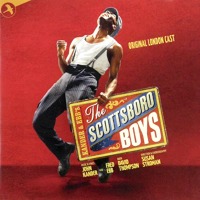 London Cast, 2014 (JAY)
London Cast, 2014 (JAY)  (4 / 5) This cast album bears a close similarity to the 2010 version. Three of the principals crossed the Atlantic to appear in the London production of The Scottsboro Boys: Brandon Victor Dixon as Haywood Patterson, Colman Domingo as Mr. Bones, and Forrest McClendon as Mr. Tambo. Dixon may even be better here, displaying heightened exuberance in “Commencing in Chattanooga” and enormous inner strength in “You Can’t Do Me.” The ensemble numbers sound more polished, and there are some lyric changes, notably in “Make Friends With the Truth.” There’s also a bit of additional dialogue, with more details about the fate of these young men. The Interlocutor’s solo, “It’s Gonna Take Time,” was cut from the Broadway production and is absent here, but the exit music is included. Like the earlier recording, there’ a bonus track of “Go Back Home,” here performed by Dixon. A key difference between the two albums is the Interlocutor, played nastily here by Julian Glover. Where John Cullum was generally sly, Glover is more commanding, sending chills as he insists, “Shake those tambourines!” When he describes himself as “the master of these folks” in the opener, the listener can’t help thinking he means more than just master of ceremonies. Does a collector need both recordings? Probably not. But those considering staging the show may want the London one, which is closer to the licensed version. — L.F.
(4 / 5) This cast album bears a close similarity to the 2010 version. Three of the principals crossed the Atlantic to appear in the London production of The Scottsboro Boys: Brandon Victor Dixon as Haywood Patterson, Colman Domingo as Mr. Bones, and Forrest McClendon as Mr. Tambo. Dixon may even be better here, displaying heightened exuberance in “Commencing in Chattanooga” and enormous inner strength in “You Can’t Do Me.” The ensemble numbers sound more polished, and there are some lyric changes, notably in “Make Friends With the Truth.” There’s also a bit of additional dialogue, with more details about the fate of these young men. The Interlocutor’s solo, “It’s Gonna Take Time,” was cut from the Broadway production and is absent here, but the exit music is included. Like the earlier recording, there’ a bonus track of “Go Back Home,” here performed by Dixon. A key difference between the two albums is the Interlocutor, played nastily here by Julian Glover. Where John Cullum was generally sly, Glover is more commanding, sending chills as he insists, “Shake those tambourines!” When he describes himself as “the master of these folks” in the opener, the listener can’t help thinking he means more than just master of ceremonies. Does a collector need both recordings? Probably not. But those considering staging the show may want the London one, which is closer to the licensed version. — L.F.
Shrek
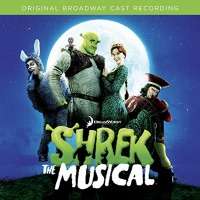 Original Broadway Cast, 2010 (Verve)
Original Broadway Cast, 2010 (Verve)  (3 / 5) Not to be outdone by Disney, the Dreamworks company decided to come to Broadway with a musical adaptation of its Oscar winning animated film Shrek, about an everyman ogre trying to maintain his peace of mind while wading through numerous fairy tales — some of which aren’t quite so magical. While the original Broadway production proved to be wildly over-produced and too loyal to the film in terms of its design and book, the cast recording reveals that, at its core, Shrek has considerable charm and a solid score aided by Danny Troob’s healthily full orchestrations. It’s not a surprise that composer Jeanine Tesori brought a mixture of earnestness and funky independence to the piece, but it is a surprise that first-time lyricist David Lindsay-Abaire crafted such well-structured and genuinely witty lyrics. The score boasts a fair number of highlights, such as “I Know It’s Today” and “When Words Fail,” though some songs try too hard for off-kilter humor — for example, “Story of My Life” and “What’s Up, Duloc?” In the title role, Brian d’Arcy James had to balance his own musical theater instincts with the burden of recreating a highly beloved film character; for the most part, he succeeded, especially in the touching “Who I’d Be.” Sadly, the talented Daniel Breaker was not given as much artistic freedom in the role of Shrek’s best friend Donkey, and instead offers an Eddie Murphy impression through much of this cast album. More successful principal players include Sutton Foster as not-your-average-princess Fiona, going toe to toe with James in the childishly gleeful “I Think I Got You Beat,” and Christopher Sieber as the hyper-sinister, height-challenged villain Lord Farquad. In their score, Tesori and Abaire gave Shrek a mischievous soul that was sadly lost among the giant scenery of the original production. Luckily, it’s captured here. — Matt Koplik
(3 / 5) Not to be outdone by Disney, the Dreamworks company decided to come to Broadway with a musical adaptation of its Oscar winning animated film Shrek, about an everyman ogre trying to maintain his peace of mind while wading through numerous fairy tales — some of which aren’t quite so magical. While the original Broadway production proved to be wildly over-produced and too loyal to the film in terms of its design and book, the cast recording reveals that, at its core, Shrek has considerable charm and a solid score aided by Danny Troob’s healthily full orchestrations. It’s not a surprise that composer Jeanine Tesori brought a mixture of earnestness and funky independence to the piece, but it is a surprise that first-time lyricist David Lindsay-Abaire crafted such well-structured and genuinely witty lyrics. The score boasts a fair number of highlights, such as “I Know It’s Today” and “When Words Fail,” though some songs try too hard for off-kilter humor — for example, “Story of My Life” and “What’s Up, Duloc?” In the title role, Brian d’Arcy James had to balance his own musical theater instincts with the burden of recreating a highly beloved film character; for the most part, he succeeded, especially in the touching “Who I’d Be.” Sadly, the talented Daniel Breaker was not given as much artistic freedom in the role of Shrek’s best friend Donkey, and instead offers an Eddie Murphy impression through much of this cast album. More successful principal players include Sutton Foster as not-your-average-princess Fiona, going toe to toe with James in the childishly gleeful “I Think I Got You Beat,” and Christopher Sieber as the hyper-sinister, height-challenged villain Lord Farquad. In their score, Tesori and Abaire gave Shrek a mischievous soul that was sadly lost among the giant scenery of the original production. Luckily, it’s captured here. — Matt Koplik
Spring Awakening
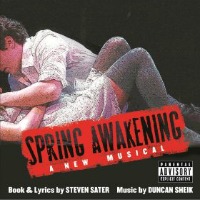 Original Broadway Cast, 2006 (Verve)
Original Broadway Cast, 2006 (Verve)  (4 / 5) Even with the success of such shows as Hair and Rent, the original pop/rock musical theater score has had a spotty history on Broadway, but it saw a major comeback in 2006 with the raw and highly charged Spring Awakening. Based on Frank Wedekind’s expressionist play, the musical tells of young teenagers in 19th century Germany on the verge of sexuality, and the adults who refuse to explain to them what their newfound urges mean. On stage, Spring Awakening crackled and even exploded with energy, but while the cast album offers a pristine presentation of the score, it lacks some of the energy and spirit that made the show itself so moving. The cast — including future stars Jonathan Groff, Lea Michele, and John Gallagher, Jr. — still provides impressive vocals, but they are less expressive than they were on stage. “My Junk,” “Totally F****d,” and a few other high-powered songs lose some of their edge, although the quieter, more intimate numbers (“Whispering, ” “The Guilty Ones”) remain haunting. In truth, if any show called for a live cast recording, it was this one. Still, the Duncan Sheik-Steven Sater score is exceptionally strong. Sheik has provided many gorgeous, infectious melodies and orchestrated them well to season the score’s alternative rock sensibility with small nods to the show’s 19th German setting. Sater’s lyrics have a flair for the poetic, even if there are some frustrating false rhymes (e.g. “sweet and unknown/longing for a home” “all this/my lips”). To date, this is the only cast album of Spring Awakening, and it’s a good one. But let’s hope that future recordings capture a bit more of the show’s spark. — Matt Koplik
(4 / 5) Even with the success of such shows as Hair and Rent, the original pop/rock musical theater score has had a spotty history on Broadway, but it saw a major comeback in 2006 with the raw and highly charged Spring Awakening. Based on Frank Wedekind’s expressionist play, the musical tells of young teenagers in 19th century Germany on the verge of sexuality, and the adults who refuse to explain to them what their newfound urges mean. On stage, Spring Awakening crackled and even exploded with energy, but while the cast album offers a pristine presentation of the score, it lacks some of the energy and spirit that made the show itself so moving. The cast — including future stars Jonathan Groff, Lea Michele, and John Gallagher, Jr. — still provides impressive vocals, but they are less expressive than they were on stage. “My Junk,” “Totally F****d,” and a few other high-powered songs lose some of their edge, although the quieter, more intimate numbers (“Whispering, ” “The Guilty Ones”) remain haunting. In truth, if any show called for a live cast recording, it was this one. Still, the Duncan Sheik-Steven Sater score is exceptionally strong. Sheik has provided many gorgeous, infectious melodies and orchestrated them well to season the score’s alternative rock sensibility with small nods to the show’s 19th German setting. Sater’s lyrics have a flair for the poetic, even if there are some frustrating false rhymes (e.g. “sweet and unknown/longing for a home” “all this/my lips”). To date, this is the only cast album of Spring Awakening, and it’s a good one. But let’s hope that future recordings capture a bit more of the show’s spark. — Matt KoplikSpamalot
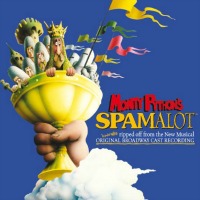 Original Broadway Cast, 2005 (Decca Broadway)
Original Broadway Cast, 2005 (Decca Broadway)  (2 / 5) This show, based on the classic film comedy Monty Python and the Holy Grail, attempts to spoof the formula of musical theatre while still adhering to it. Written by Monty Python founder Eric Idle and frequent collaborator John du Prez, Spamalot sticks to what the audience remembers from the beloved movie and embellishes, rather than expands, the material for the stage. The songs were created by musicalizing famous jokes from the film (“Run Away,” “He Is Not Dead Yet”) or by breaking the fourth wall, stopping the action to turn a one-liner into a full-blown production number (for example, “You Won’t Succeed on Broadway”). Though some of du Prez’s tunes are hummable, and Idle’s lyrics occasionally contain the daffy Monty Python sensibility, their work doesn’t match the ingenuity of the film. What keeps the recording afloat is a dynamic cast of comic heavyweights including Tim Curry, David Hyde Pierce, Hank Azaria, and Christian Borle, each playing a variety of different roles that showcase their considerable talents. But it’s Sara Ramirez, a Tony winner for her performance, who walks away with the album. As the Lady of the Lake, the one role added for the stage show, Ramirez matches her co-stars’ comedic instincts and bests all of them with her explosive vocal versatility. While her two big numbers, “Find Your Grail” and “Diva’s Lament,” are not particularly well written, Ramirez spins them both into showstoppers. Spamalot won the 2005 Tony Award for Best Musical (yet no awards for the writers) and played for nearly three years — proving that, although satire is what closes on Saturday night (as per George S. Kaufman), a meta-parody can run a lot longer. — Matt Koplik
(2 / 5) This show, based on the classic film comedy Monty Python and the Holy Grail, attempts to spoof the formula of musical theatre while still adhering to it. Written by Monty Python founder Eric Idle and frequent collaborator John du Prez, Spamalot sticks to what the audience remembers from the beloved movie and embellishes, rather than expands, the material for the stage. The songs were created by musicalizing famous jokes from the film (“Run Away,” “He Is Not Dead Yet”) or by breaking the fourth wall, stopping the action to turn a one-liner into a full-blown production number (for example, “You Won’t Succeed on Broadway”). Though some of du Prez’s tunes are hummable, and Idle’s lyrics occasionally contain the daffy Monty Python sensibility, their work doesn’t match the ingenuity of the film. What keeps the recording afloat is a dynamic cast of comic heavyweights including Tim Curry, David Hyde Pierce, Hank Azaria, and Christian Borle, each playing a variety of different roles that showcase their considerable talents. But it’s Sara Ramirez, a Tony winner for her performance, who walks away with the album. As the Lady of the Lake, the one role added for the stage show, Ramirez matches her co-stars’ comedic instincts and bests all of them with her explosive vocal versatility. While her two big numbers, “Find Your Grail” and “Diva’s Lament,” are not particularly well written, Ramirez spins them both into showstoppers. Spamalot won the 2005 Tony Award for Best Musical (yet no awards for the writers) and played for nearly three years — proving that, although satire is what closes on Saturday night (as per George S. Kaufman), a meta-parody can run a lot longer. — Matt Koplik
Something Rotten!
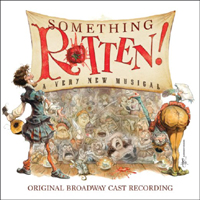 Original Broadway Cast, 2015 (Ghostlight)
Original Broadway Cast, 2015 (Ghostlight)  (5 / 5)The more one knows about Broadway musicals, the more convulsed with laughter one becomes upon experiencing Something Rotten!, a smart stew of shrewd satire and affectionate parody. It also helps to know something about Shakespeare, as the show’s riotous plot, set in the 1590s, concerns fraternal playwrights Nick and Nigel Bottom’s attempt to rival The Bard’s popularity by penning a game-changing theatrical hit of their own. Upon the advice of an imperfect soothsayer who foresees Omelette to be the title of Shakespeare’s greatest play, the sibling scribes, determined to beat The Bard to the punch, create a genre-birthing extravaganza: Omelette: The Musical. Absent the visual humor of the production’s mockeries of iconic Broadway choreography, the cast album is a laugh-fest nonetheless, because much of the show’s spoofing lies in Wayne and Karey Kirkpatrick’s score, keenly orchestrated to recall the jazz-inflected sounds of Broadway’s Golden Age and the later pop-rock sensibilities. From the first-act show-stopper, “A Musical,” to the play-within-the-play numbers “It’s Eggs” and “Make an Omelette,” the songs overflow with hilarious musical-theater references. The abundant allusions come at such a frenzied pace that only by listening repeatedly to the recording can one digest every tasty morsel. While Brian d’Arcy James, as Nick, persuasively bemoans “God, I Hate Shakespeare,” Christian Borle’s Tony-winning depiction of Nick’s nemesis as a leather-clad, Renaissance-era rock star grabs the spotlight. The recording effectively captures Borle’s characterization of Shakespeare as evoked through his adoption of the British accent and patronizing tone of a rocker from across the pond; his “Will Power” and “Hard to Be the Bard” cleverly mimic ’60s and ’70s pop-music stylings. Considering its derivative nature, Something Rotten! is remarkably original, a fitting reflection of its undergirding themes of self-expression, artistic integrity, and the power of poetry combined with music. Show tune fanatics, to thine own self be true! – Lisa Jo Sagolla
(5 / 5)The more one knows about Broadway musicals, the more convulsed with laughter one becomes upon experiencing Something Rotten!, a smart stew of shrewd satire and affectionate parody. It also helps to know something about Shakespeare, as the show’s riotous plot, set in the 1590s, concerns fraternal playwrights Nick and Nigel Bottom’s attempt to rival The Bard’s popularity by penning a game-changing theatrical hit of their own. Upon the advice of an imperfect soothsayer who foresees Omelette to be the title of Shakespeare’s greatest play, the sibling scribes, determined to beat The Bard to the punch, create a genre-birthing extravaganza: Omelette: The Musical. Absent the visual humor of the production’s mockeries of iconic Broadway choreography, the cast album is a laugh-fest nonetheless, because much of the show’s spoofing lies in Wayne and Karey Kirkpatrick’s score, keenly orchestrated to recall the jazz-inflected sounds of Broadway’s Golden Age and the later pop-rock sensibilities. From the first-act show-stopper, “A Musical,” to the play-within-the-play numbers “It’s Eggs” and “Make an Omelette,” the songs overflow with hilarious musical-theater references. The abundant allusions come at such a frenzied pace that only by listening repeatedly to the recording can one digest every tasty morsel. While Brian d’Arcy James, as Nick, persuasively bemoans “God, I Hate Shakespeare,” Christian Borle’s Tony-winning depiction of Nick’s nemesis as a leather-clad, Renaissance-era rock star grabs the spotlight. The recording effectively captures Borle’s characterization of Shakespeare as evoked through his adoption of the British accent and patronizing tone of a rocker from across the pond; his “Will Power” and “Hard to Be the Bard” cleverly mimic ’60s and ’70s pop-music stylings. Considering its derivative nature, Something Rotten! is remarkably original, a fitting reflection of its undergirding themes of self-expression, artistic integrity, and the power of poetry combined with music. Show tune fanatics, to thine own self be true! – Lisa Jo Sagolla
Sunday in the Park With George
 Original Broadway Cast, 1984 (RCA)
Original Broadway Cast, 1984 (RCA)  (4 / 5) Few Broadway composers could successfully make a painting into a musical, but Stephen Sondheim turned Georges Seurat’s “A Sunday Afternoon on the Island of la Grande Jatte” into one of his most unforgettable and distinctive works. In essence, Sunday in the Park With George is a meditation on the nature of art as viewed in the past (Seurat in the first act) and the present (his descendant, named George, in the second). Although the show has been criticized for the disparity in style between its two acts, each informs the other to create a cohesive whole, and the score has real depth and color. Sondheim reflects Seurat’s unique painting style through the use of staccato notes, playing with the various hues of music much as the artist worked with pigments. Songs such as “Color and Light” and “Finishing the Hat” are particularly remarkable in sound and texture. A few of the compositions are slightly more conventional: “We Do Not Belong Together,” the aching cry of Seurat’s mistress, Dot; the beautiful “Beautiful,” for Georges and his mother; and the rapturous Act I finale “Sunday,” during which the painting finally comes to life. The second act begins with the amusing “It’s Hot Up Here,” sung by the characters in the painting, followed by the brilliant musical scene “Putting It Together” (about George’s fundraising attempts), “Children and Art” (about what we leave behind when we die), and “Lesson #8” (about the constantly mutating nature of art and life). As Georges/George and Dot/Marie, Mandy Patinkin and Bernadette Peters do some of the finest work of their careers, leading an excellent company through the score’s intricacies. Sunday is one of Sondheim’s finest achievements, though it may require several hearings to be fully appreciated. — Matthew Murray
(4 / 5) Few Broadway composers could successfully make a painting into a musical, but Stephen Sondheim turned Georges Seurat’s “A Sunday Afternoon on the Island of la Grande Jatte” into one of his most unforgettable and distinctive works. In essence, Sunday in the Park With George is a meditation on the nature of art as viewed in the past (Seurat in the first act) and the present (his descendant, named George, in the second). Although the show has been criticized for the disparity in style between its two acts, each informs the other to create a cohesive whole, and the score has real depth and color. Sondheim reflects Seurat’s unique painting style through the use of staccato notes, playing with the various hues of music much as the artist worked with pigments. Songs such as “Color and Light” and “Finishing the Hat” are particularly remarkable in sound and texture. A few of the compositions are slightly more conventional: “We Do Not Belong Together,” the aching cry of Seurat’s mistress, Dot; the beautiful “Beautiful,” for Georges and his mother; and the rapturous Act I finale “Sunday,” during which the painting finally comes to life. The second act begins with the amusing “It’s Hot Up Here,” sung by the characters in the painting, followed by the brilliant musical scene “Putting It Together” (about George’s fundraising attempts), “Children and Art” (about what we leave behind when we die), and “Lesson #8” (about the constantly mutating nature of art and life). As Georges/George and Dot/Marie, Mandy Patinkin and Bernadette Peters do some of the finest work of their careers, leading an excellent company through the score’s intricacies. Sunday is one of Sondheim’s finest achievements, though it may require several hearings to be fully appreciated. — Matthew Murray
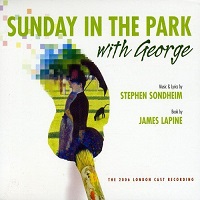 London Cast, 2006 (PS Classics, 2CDs)
London Cast, 2006 (PS Classics, 2CDs)  (1 / 5) This recording showcases compelling, committed vocal performances by Daniel Evans and Jenna Russell as George and Dot/Marie, though their Brit accents — his pretty much RP, hers more North London — may take some getting used to. But for many listeners, the extreme diminution of the size of the orchestra here as compared to the forces heard on the original Broadway cast album will be reason enough to exclude it from their collections. The original justification for the pathetically meager instrumentation was that this production was staged at the intimate Menier Chocolate Factory, but there was no significant increase in the number of musicians for the cast album (as often happens) or when the show transferred to Broadway under the auspices of the Roundabout Theatre Company, which presented it in the large Studio 54 venue. On the recording, this is a greater liability in some songs (e.g., “Sunday”) than others, but the tiny orchestra — or, rather, small combo or chamber ensemble — is a major disappointment throughout. The production itself was enjoyable for the leads and for a wonderfully creative use of projections to display Georges Seurat’s art, but minus the visuals, the cast album doesn’t really justify its existence. — Michael Portantiere
(1 / 5) This recording showcases compelling, committed vocal performances by Daniel Evans and Jenna Russell as George and Dot/Marie, though their Brit accents — his pretty much RP, hers more North London — may take some getting used to. But for many listeners, the extreme diminution of the size of the orchestra here as compared to the forces heard on the original Broadway cast album will be reason enough to exclude it from their collections. The original justification for the pathetically meager instrumentation was that this production was staged at the intimate Menier Chocolate Factory, but there was no significant increase in the number of musicians for the cast album (as often happens) or when the show transferred to Broadway under the auspices of the Roundabout Theatre Company, which presented it in the large Studio 54 venue. On the recording, this is a greater liability in some songs (e.g., “Sunday”) than others, but the tiny orchestra — or, rather, small combo or chamber ensemble — is a major disappointment throughout. The production itself was enjoyable for the leads and for a wonderfully creative use of projections to display Georges Seurat’s art, but minus the visuals, the cast album doesn’t really justify its existence. — Michael Portantiere
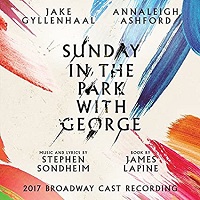 Broadway Cast, 2017 (Arts Music, 2CDs)
Broadway Cast, 2017 (Arts Music, 2CDs)  (3 / 5) Jake Gyllenhaal made his name as a movie actor, and became a star in that sphere in such movies as Donnie Darko, Prisoners, Brokeback Mountain, and Nightcrawler before he tackled musical theater in the rapturously received 2015 presentation of Menken and Ashman’s Little Shop of Horrors at New York City Center, following up that success with the equally acclaimed 2017 Broadway revival of Sondheim and Lapine’s Sunday in the Park With George. On the cast album belatedly yielded by the latter production, Gyllenhaal’s vocal acting is of a very high level, and he brings to the role of George a youthful quality and an underlying charm that go a long way toward making an often exasperating character sympathetic. But it must be said that, while his vocal tone is very pleasing, Gyllenhaal has a disconcerting tendency to sing off pitch on sustained notes — sometimes in straight tone, sometimes with a vibrato that turns into more of a wobble. No such issues are present in the singing of Annaleigh Ashford as Dot/Marie; her voice is clear as a bell and rock-solid in pitch, and her performance bursts with personality. The album also features stellar if brief contributions from an A-list supporting cast including Brooks Ashmanskas, Jenni Barber, Phillip Boykin, Erin Davie, Penny Fuller, Robert Sean Leonard, Liz McCartney, Michael McElroy, Ruthie Ann Miles, Ashley Park, and David Turner. The inclusion of quite a bit of spoken dialogue from James Lapine’s often stilted, problematic book for the show on this 2-CD set might be considered a mark against it, especially when you repeatedly listen to all of those lines in which, for some annoying reason, the characters completely eschew the natural use of contractions — e.g., “I guess I did not learn it soon enough….Sometimes he will work all night long.” But of course, any cast album of a Stephen Sondheim show is all about the score, and this one has many pleasures to offer despite the caveats noted. — M.P.
(3 / 5) Jake Gyllenhaal made his name as a movie actor, and became a star in that sphere in such movies as Donnie Darko, Prisoners, Brokeback Mountain, and Nightcrawler before he tackled musical theater in the rapturously received 2015 presentation of Menken and Ashman’s Little Shop of Horrors at New York City Center, following up that success with the equally acclaimed 2017 Broadway revival of Sondheim and Lapine’s Sunday in the Park With George. On the cast album belatedly yielded by the latter production, Gyllenhaal’s vocal acting is of a very high level, and he brings to the role of George a youthful quality and an underlying charm that go a long way toward making an often exasperating character sympathetic. But it must be said that, while his vocal tone is very pleasing, Gyllenhaal has a disconcerting tendency to sing off pitch on sustained notes — sometimes in straight tone, sometimes with a vibrato that turns into more of a wobble. No such issues are present in the singing of Annaleigh Ashford as Dot/Marie; her voice is clear as a bell and rock-solid in pitch, and her performance bursts with personality. The album also features stellar if brief contributions from an A-list supporting cast including Brooks Ashmanskas, Jenni Barber, Phillip Boykin, Erin Davie, Penny Fuller, Robert Sean Leonard, Liz McCartney, Michael McElroy, Ruthie Ann Miles, Ashley Park, and David Turner. The inclusion of quite a bit of spoken dialogue from James Lapine’s often stilted, problematic book for the show on this 2-CD set might be considered a mark against it, especially when you repeatedly listen to all of those lines in which, for some annoying reason, the characters completely eschew the natural use of contractions — e.g., “I guess I did not learn it soon enough….Sometimes he will work all night long.” But of course, any cast album of a Stephen Sondheim show is all about the score, and this one has many pleasures to offer despite the caveats noted. — M.P.


